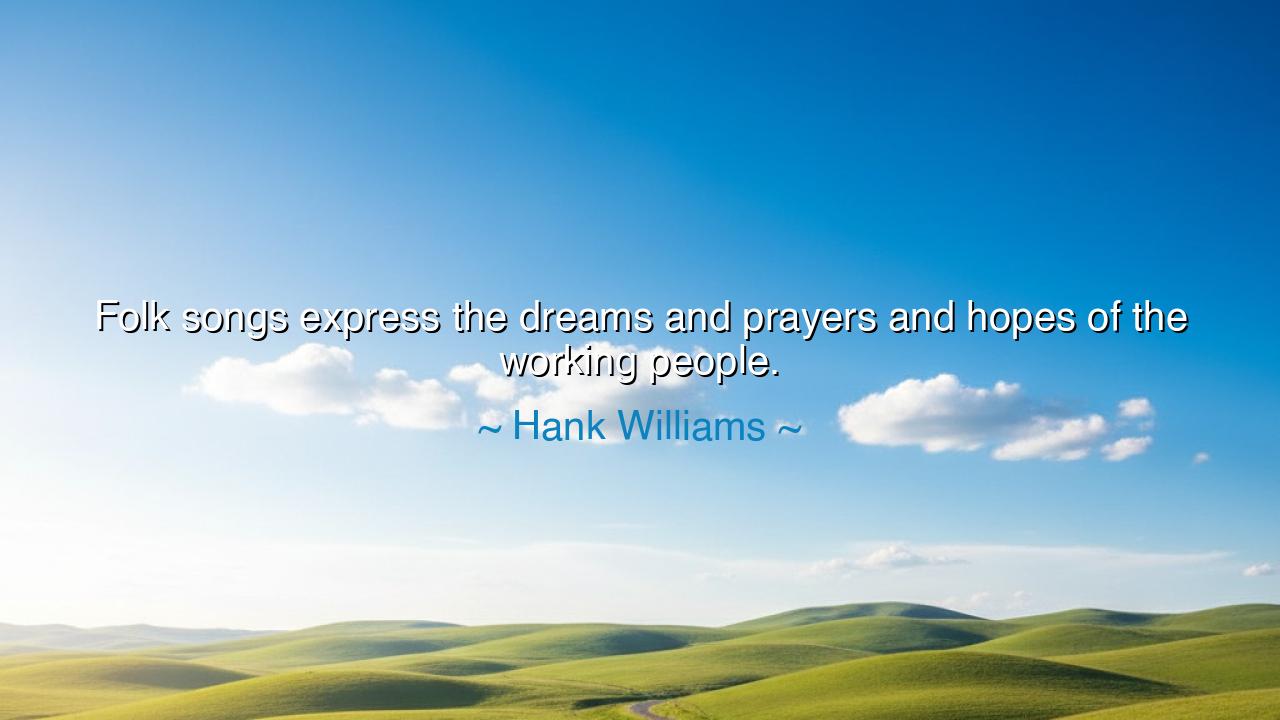
Folk songs express the dreams and prayers and hopes of the






The words of Hank Williams, the wandering bard of the American heartland, rise like a hymn from the soil of struggle and song: “Folk songs express the dreams and prayers and hopes of the working people.” In this single phrase, Williams captures the eternal bond between music and humanity — between the suffering of the poor and the voice of the soul. He reminds us that folk songs are not mere melodies; they are living testaments, woven from the tears, labor, and longing of those who built the world with their hands. In every verse, there breathes the spirit of endurance — the quiet courage of those who toil, who love, who lose, yet still find a way to sing.
The origin of these words lies deep in the story of America and in the tradition of countless peoples before it. Hank Williams, born into poverty in the rural South, knew the pain and poetry of the working class firsthand. His father was a disabled veteran; his mother worked tirelessly to keep the family alive. The songs that surrounded him — the hymns, the ballads, the laments sung by laborers in the fields and miners in the dark — became his teachers. To Williams, these were not performances but prayers. They carried the truth that no sermon could capture: that through song, the poor could speak to Heaven, to history, and to one another. Thus, his declaration becomes both personal and universal — a reverence for the people who, through music, transformed hardship into beauty.
When Williams says that folk songs express “dreams and prayers and hopes,” he speaks to the sacred triad of human endurance. Dreams — the visions of a better life that lift weary hearts beyond the confines of poverty. Prayers — the yearning for mercy and meaning amid suffering. Hopes — the stubborn belief that tomorrow can be kinder than today. In the ancient sense, these songs are incantations — spoken offerings to gods unseen and destinies uncertain. They are the people’s scripture, written not in ink but in melody, carried on the wind through time. In their simplicity, they hold truths that philosophers have struggled to name: that the human soul, no matter how beaten, will always rise in song.
Consider, for a moment, the story of the American blues, born from the voices of enslaved Africans who sang to survive. Those songs were not composed in comfort but in chains. Yet from their grief rose the foundation of nearly all modern music. Their folk songs became both lament and liberation — a way to remember what freedom felt like, even when freedom was denied. When the field worker sang of rivers and roads, he was not describing the land; he was singing his dreams, his prayers, his hope for deliverance. And in time, those songs traveled beyond the plantations, beyond America, to inspire generations of musicians and poets — including Hank Williams himself. Thus, from sorrow came the seed of greatness, and from silence, the eternal rhythm of human will.
In every culture, this truth endures. The Irish ballads sung in rebellion, the Slavic chants of mourning, the Japanese folk songs of harvest — all are variations of the same voice: the working people, speaking to the universe in harmony and defiance. For while kings build monuments and scholars write books, it is the common man who carries the memory of humanity in his song. The folk singer is the historian of the heart, the guardian of collective soul. When Hank Williams sang “I Saw the Light,” he was not merely singing about religion — he was giving voice to the ancient longing of all who walk in darkness, seeking redemption through melody.
The lesson that Williams imparts is clear and timeless: never dismiss the humble song, nor the humble soul that sings it. In every folk song, in every voice raised in work or worship, there is wisdom — a reminder that greatness is not born in privilege but in perseverance. The working man’s song is a mirror of his soul, and through it, the world remembers what it means to be human. It teaches us empathy — to listen not only to the music of triumph but to the music of struggle. For the heart that listens to such songs becomes wiser, gentler, and more just.
So, O seeker of understanding, carry this truth forward: let your own life be a song of endurance and faith. When the days grow heavy, remember the ones who sang before you — those who worked the fields, who braved the storms, who lifted their voices not because life was easy, but because it was hard. Sing your own dreams, your own prayers, your own hopes, and let them rise like smoke to the heavens. For in every true song, as Hank Williams knew, the human spirit endures — not as a whisper, but as an eternal melody echoing through the ages, binding us all in the harmony of survival and love.






AAdministratorAdministrator
Welcome, honored guests. Please leave a comment, we will respond soon